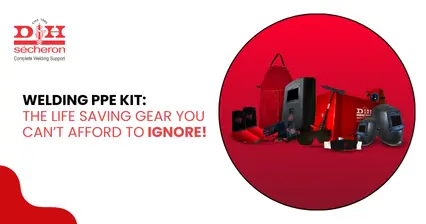Exploring the Advantages of Stainless Steel Electrodes in Welding Applications
Introduction
In its basic form, stainless steel is an alloy of iron that resists rusting and corrosion; hence, this provides the material for many industries. Foremost among them is the welding industry, where stainless steel electrodes come into play. The following blog post will talk about some of the benefits of using stainless steel electrodes in welding applications and how exactly a leading manufacturer like D&H Secheron is helping in this realm.
The Process of Welding and Metals Used
Welding is fabricating material, say metals or thermoplastics, using heat. This is generally done by melting the workpieces and adding filler material to form a pool of molten material cooling into a solid joint. The weld can even be stronger than the parent metals.
There are different processes of welding. These include MIG welding, TIG welding, Stick welding, Flux cord arc welding, Plasma Arc welding, Electron beam welding, Laser beam welding, and Gas welding. Different types of metals have different welding applications that are unique to them.
The most commonly used metals are steel, stainless steel, aluminum, copper, and brass, each representing strength, flexibility, corrosion resistance, and electrical conductivity.
Understanding Stainless Steel Electrodes
A welding electrode is an alloy or metal wire or rod piece that conducts electric current and allows heating to an adequate temperature to join both workpieces together by fusing, softening, or melting the workpiece. Other common names for such electrodes are SS welding rods used specifically to weld stainless steel materials. They are formulated with precise alloy compositions to match the base metal for the desired weld characteristics.
Types of Stainless Steel
There are over 100 grades of stainless steel, but they can be classified into five major groups: austenitic, ferritic, martensitic, duplex (austenitic-ferritic), and precipitation-hardening. Each kind has its unique property and use, making them suitable for application in welding.
Advantages of Stainless Steel Electrodes in Welding
Stainless steel electrodes offer several advantages in welding applications:
High Strength and Durability: The stainless steel electrodes strengthen the weld metal against oxidation and corrosion.
Versatility: It will be used to weld in a variety of welding processes and be able to weld the different categories of stainless steel.
Corrosion Resistance: These electrodes are manufactured with stainless steel containing a chromium content that can form a passive film on it. The material can protect itself and even acquire self-healing characteristics with paraffin oil.
Cost saving: the stainless steel electrodes are of lifetime material, and their maintenance is very easy. Their cost is also lower than that of carbon steel electrodes.
D&H Secheron: Leading the Way
At D&H Secheron, we offer a wide range in all divisions of the best quality stainless steel welding electrodes available in varied thicknesses, specifications, grades, and sizes. Our welding products are meant to cater to every customer’s needs, ensuring smooth results coupled with high production efficiency.
Conclusion
Stainless steel electrodes are one of the key parts of the welding industry, which holds its set of advantages, such as strength, durability, versatility, and cost-effectiveness. Keeping in mind the needs of the welding market D&H Secheron ensures to formulate stainless steel electrodes of an unexcelled quality level that would sufficiently.
11 May 2025 | Welding
An In-Depth Exploration of Low-Alloy Steel: Your Comprehensive Guide
11 May 2025 | Welding
Nagpur - Bori - Tuljapur Road MSH-3 in Yavatmal District (Maharashtra)
11 May 2025 | Welding
Guidelines to Understand Gas Welding: Applications, Advantages & Disadvantages
11 May 2025 | Welding
3 Tips for Finding the Best Mild Steel Electrode for Your Application
11 May 2025 | Welding
How to Select the Right Welding Filler Wires for Stainless Steel Welding?
11 May 2025 | Welding
Building the Narendra Modi Stadium with Norma V and Autotherme-1 Electrodes
11 May 2025 | Welding
Low Alloy Steel Welding in a (PEB) Pre Engineered Building Structure
11 May 2025 | Welding
Welding Rods: Different Types and Tips for Properly Storing and Handling
11 May 2025 | Welding
Tips for Flawless Welds with Stainless Steel Electrodes: Pros and Cons
11 May 2025 | Welding
Exploring Applications and Benefits of Stainless Steel Welding Electrodes
11 May 2025 | Welding
Welding Basics: Joining Metals with Heat and Pressure - A Beginners Guide
11 May 2025 | Welding
Distinguishing Low-Alloy Steel from High-Alloy Steel: Understanding the Variations
11 May 2025 | Welding
Hard Facing Wire - Understanding the Process and Achieving Optimal Result
11 May 2025 | Welding
Weathering Steel vs. Traditional Steel: A Comparative Analysis of Performance
11 May 2025 | Welding
Choosing the Right Welding Rod: Why 6013 Electrodes Might Be Your Ideal Option
11 May 2025 | Welding
Why 7018 Electrodes Are Preferred for High-Strength Welds in Pipeline Construction
11 May 2025 | Welding
Filler Wire vs. Stainless Steel Filler Wire: Understanding the Key Differences
11 May 2025 | Welding
Exploring the Impact of Filler Material on Welding Quality and Durability
11 May 2025 | Welding
Choosing the Right Cast Iron Electrode for Different Welding Projects
11 May 2025 | Welding
Top Advantages of Cast Iron Electrodes for Industrial Welding Applications
11 May 2025 | Welding
Key Benefits and Challenges of Using TIG Welding in Industrial Projects
11 May 2025 | Welding
5 Reasons Why 7018 Electrode is the Gold Standard for Welding Professionals
11 May 2025 | Welding
Top 5 Advantages of Flux Cored Arc Welding for Heavy-Duty Applications.png)
11 May 2025 | Welding
Lotherme-601: A Game-Changer for Restoring Shoulder Pins in Heavy Machinery
11 May 2025 | Welding
How D&H Sécheron Helped Repair a Rotary Kiln’s Cooler Section with LoTherme 352
11 May 2025 | Welding
Piston Repair for Mining Industry: Cost-Effective Solutions with LoTherme 468.webp)






.jpg)








































.jpg)
.jpg)

.jpg)

.jpg)





.jpg)
.jpg)
.jpg)



.webp)
.jpg)
.jpg)
.webp)
.jpg)






















.png)



.webp)

.webp)
.webp)



